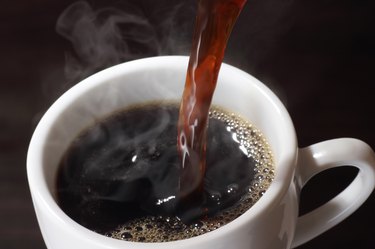
If you have high blood pressure, you know lifestyle changes like diet — in addition to medications — can play a role in keeping it under control. So, you may wonder about coffee and if people taking high blood pressure medicine should avoid caffeine. The answer depends on how caffeine affects you.
Related Reading
Video of the Day
How Caffeine Affects Blood Pressure
"Caffeine causes stimulation of the sympathetic nervous system — the fight-or-flight response — so it increases blood pressure and heart rate," says Houston, Texas-based John P. Higgins, MD, chief of cardiology at Lyndon B. Johnson General Hospital and professor of cardiovascular medicine and sports cardiology at the University of Texas McGovern Medical School.
Video of the Day
Increases in blood pressure "depend on the amount of caffeine and whether someone drinks caffeine regularly," he says. "Studies show regular drinkers have blood pressure increases of 0 to 8 points. People who don't take in caffeine daily have higher blood pressure increases in the short term, usually for up to three hours after consumption."
Caffeine can cause a short — but sometimes significant — jump in blood pressure, even if you don't have high blood pressure, according to the Mayo Clinic. Researchers have varying viewpoints on why. Some think it's because caffeine causes the release of the hormone adrenaline, which elevates blood pressure. Others point to caffeine as a potential blocker of a hormone responsible for keeping arteries widened — and constricted arteries may cause temporary high blood pressure.
But people who drink caffeinated beverages, especially coffee, on a regular basis develop a tolerance to caffeine, so they do not develop long-term high blood pressure, according to the Mayo Clinic.
Should You Avoid Caffeine on BP Medication?
A small December 2016 study in the American Journal of Hypertension that looked at the effects of caffeine on blood pressure medication found caffeine might interfere with blood pressure medication in people who were not drinking coffee regularly.
But based on their study and review of available data, researchers suggested more studies are needed, as very few studies have been performed on the effects of caffeine on high blood pressure medications, and there are no current guidelines for or against caffeine while on blood pressure medicines.
Like many dietary effects, it's individual, and you may respond differently than someone else.
"If someone is a regular daily coffee drinker," Dr. Higgins says, "the changes in blood pressure are minimal, so no need to avoid. If someone did notice a big jump in blood pressure after drinking coffee, energy drinks or taking caffeine tablets, they should probably switch to decaf coffee — which does not raise blood pressure as much — and avoid energy drinks and caffeine tablets."
Related Reading
Safe Limits for Caffeine With High Blood Pressure
If you have high blood pressure, "a limit of about 200 milligrams, or the amount in about two 8-ounce cups of regular coffee, is the usual advice," Dr. Higgins says.
But the amount of caffeine varies between types of coffee brews, and there's a big range of possible caffeine amounts in other caffeinated sips like sodas and energy drinks, according to the Mayo Clinic. So, before determining your cutoff point, you need to read the labels.
Both Dr. Higgins and the Mayo Clinic suggest doing your own test to find out if your blood pressure is sensitive to caffeine by:
- Checking your blood pressure before drinking a cup of caffeinated coffee or an equivalent caffeinated beverage.
- After about 1 to 2 hours, check your blood pressure. If your pressure has gone up — either the top or bottom number — by 5 to 10 points, you should probably cut back on caffeine or switch to decaf.
If in doubt, talk to your doctor. And keep in mind that if you are a regular coffee drinker, you should cut back on caffeine gradually to avoid a caffeine withdrawal headache.
- John P. Higgins, MD, MBA (Hons), MPHIL, FACC, FACP, FAHA, FACSM, FASNC, FSGC, professor of medicine, McGovern Medical School, University of Texas; chief of cardiology, Lyndon B. Johnson General Hospital; director of exercise physiology, Memorial Hermann Institute for Sports Medicine and Human Performance; sports cardiologist, Houston Rockets and Rice Athletics; Houston, Texas
- Mayo Clinic: “Caffeine: How Does It Affect Blood Pressure?”
- American Journal of Hypertension: “Coffee—Antihypertensive Drug Interaction: A Hemodynamic and Pharmacokinetic Study With Felodipine”
Is this an emergency? If you are experiencing serious medical symptoms, please see the National Library of Medicine’s list of signs you need emergency medical attention or call 911.